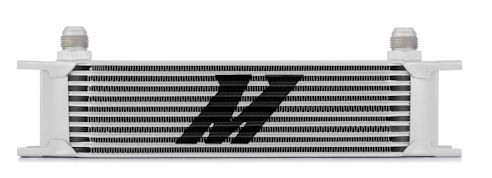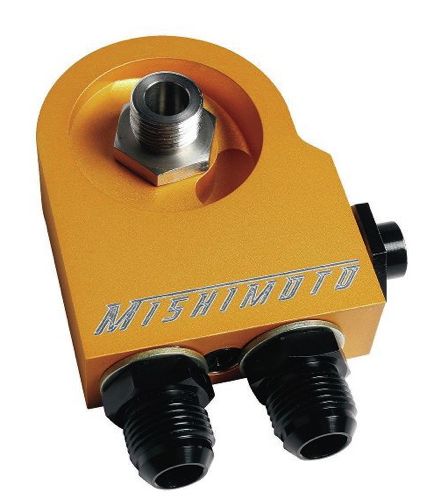Oil Cooler and Thermostatic Sandwich Plate 101 – What and Why
Heat is an engine killer. While most drivers will never experience excessively high oil temperatures, those who race or tow heavy loads can experience over-heated oil. Over-heated oil is bad for three reasons:
- As oil is heated above 200 degrees Fahrenheit (and stays at these sustained temps) breakdown of that oil is accelerated.
- As oil is heated above 200, it’s a less effective engine lubricant.
- In addition to lubricating the engine, oil also helps to cool your motor. If the oil is too hot, it’s less effective at cooling the engine because it can’t absorb as much heat.
Enter the oil cooler, which keeps engine oil at an acceptable temperature, helps cool the engine, extends oil life, and reduces engine wear.

Images courtesy of Mishimoto
What is an Oil Cooler?
An Oil Cooler looks similar to radiator. It contains a series of connected tubes that allow the oil to release excess heat before returning to the engine. If you’re driving a high-performance car or do a lot of heavy duty towing, an oil cooler like the Mishimoto 10 Row can extend the life of your engine by ensuring high-wear engine components such as piston rings, skirts, and cam bearings are lubricated with cooler oil.
Mishimoto also offers a 19 row oil cooler, but that’s likely unnecessary for all but the largest vehicles (think Mac trucks).
Of course, the trouble with an oil cooler is that it keeps cold oil from warming up….when your first start your engine, the oil temperature is the same as the ambient temperature. If the ambient temperature is very low (say below freezing), the last thing you need is an oil cooler, because an oil cooler is going to make it really hard for your oil to reach operating temperature (140 to 200 degrees). Cold oil also means that your engine will also need more time to warm-up, which reduces engine efficiency, as cold engines run rich.
Therefore, if you have an oil cooler, you probably want a thermostatic sandwich plate to go with it (at least if you live in a colder climate).
What is a Thermostatic Sandwich Plate?

Image Courtesy of Mishimoto
Do I need an Oil Cooler and Thermostatic Sandwich Plate?
If you’re planning on racing your vehicle and/or towing large loads, it definitely wouldn’t hurt. The oil cooler benefits you by removing more heat from engine while it’s working hard, and the sandwhich plate keeps the oil cooler from increasing engine warm-up times.
However, if you’re only occasionally racing or towing, the Mishimoto oil cooler and thermostatic sandwich plate combo are probably overkill.
Of course, their sleek designs look great when you’re showing off what’s under the hood, and that’s good for a couple of horsepower, right?









160F and 185F is not near high enough. Moisture in the oil won’t get evaporated out until over 200F. I believe NASCAR folks like it around 220F to 230F, but would have to verify that again. You need to offer one at 215/220 or so.
Dear Sir,
we are manufacurer of automotive heat exchanger & now automotive few customers in india need heat exchabger with thermostat
can you supply the thermostat as per customer requirement send us the details
I’m having a hard time searching for right oil sandwich plate to use on a pre start up oiler application
These things would be perfect for beach driving in summer where the surface of the sand can easily reach over 60 degrees Celcius and the the engine is working extra hard plowing the Patrol through the soft sand. When I get my new rig, I will diffidently be ordering two of these things, one for the tranny, the other for the oil!